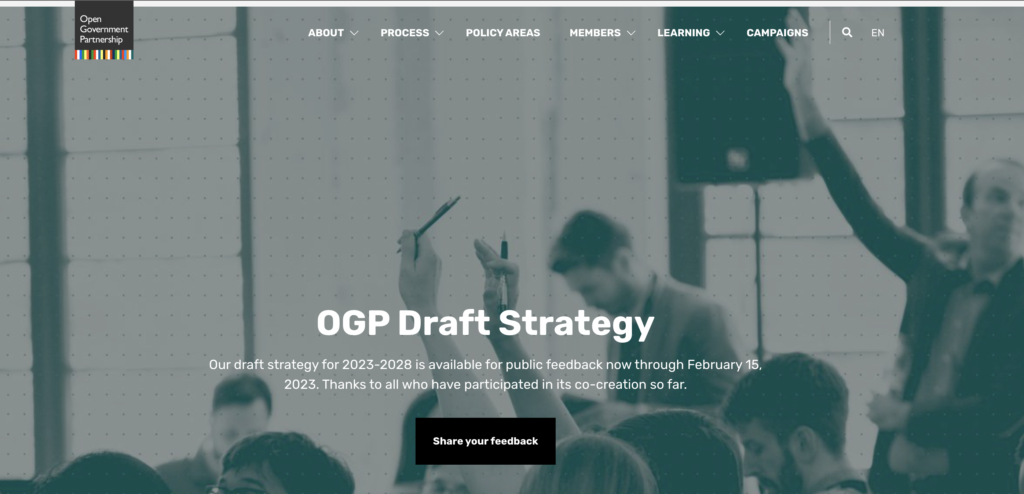E’ disponibile sul portale del la bozza di strategia per il periodo 2023-2028, disponibile fin d’ora per ricevere il feedback del pubblico fino al 15 febbraio 2023.
L’Open Government Partnership (OGP) fu creato nel 2011 da leader di governo e sostenitori della società civile, uniti per creare un partenariato unico per promuovere una governance trasparente, partecipativa, inclusiva e responsabile. Ad oggi include 76 paesi e 106 governi locali – che rappresentano più di due miliardi di persone – e migliaia di organizzazioni della società civile.
Fra le importanti iniziative dell’OGP vi sono azioni dirette a supportare la creazione congiunta di piani d’azione biennali al fine di consentire alle organizzazioni della società civile di aiutare a plasmare e supervisionare i governi.
Riportiamo di seguito alcuni spunti sulla validità dell’iniziativa internazionale dell’organizzazione a favore della trasparenza e degli Open Data.

Nel Global Report 2019 “Democrazia oltre le urne”, già veniva sottolineato come la promessa della democrazia è spesso definita dalle urne di molti Paesi. “Tale promessa, tuttavia, troppo spesso non riesce a tradursi nella realtà della vita quotidiana delle persone. In troppi paesi, i cittadini percepiscono i loro governi eletti come non-connessi e insensibili ai loro bisogni, o corrotti e catturati da interessi particolari.
In questo contesto, l’autoritarismo è di nuovo in aumento. L’onda attuale è diversa: è più graduale e meno diretta rispetto alle epoche passate. Oggi, le sfide alla democrazia vengono meno frequentemente dal furto di voti o dai colpi di stato militari; provengono da minacce persistenti ad attivisti e giornalisti, ai media e allo stato di diritto.
Le minacce alla democrazia provengono dall’esterno del processo elettorale e la nostra risposta deve essere trovata anche lì. Sia il problema che la soluzione si trovano “oltre le urne”.
Questa è la missione unica dell’Open Government Partnership (OGP): un modo semplice ma strategico per la società civile e i riformatori nei governi di unire le forze, impegnarsi nelle riforme per aprire il governo e garantire insieme che le nostre istituzioni pubbliche lavorino per i cittadini, e non per se stessi.
Dalla fondazione di OGP, un numero crescente di paesi e comunità locali – che rappresentano più di due miliardi di persone – insieme a migliaia di organizzazioni della società civile hanno aderito alla Partnership. Collettivamente, hanno preso più di 4.000 impegni di riforma in più di 250 piani d’azione biennali.
Ma le domande restano: questi impegni hanno un impatto? Prendono di mira le sfide più urgenti della nostra società? Si stanno traducendo in un modo di governare più collaborativo e responsabile? E, soprattutto, stanno aiutando a proteggere la democrazia tra le elezioni?
The draft strategy 2023-2028 for the Open Government Partnership
The Open Government Partnership (OGP) was created in 2011 by government leaders and civil society advocates who came together to create a unique partnership to promote transparent, participatory, inclusive and accountable governance. It now includes 76 countries and 106 local governments – representing more than two billion people – and thousands of civil society organizations.
Among the OGP’s notable initiatives are actions to support the joint creation of two-year action plans to enable civil society organizations to help shape and oversee governments.
In another DYDAS article, we will summarize a good Open Data practice collected in files dedicated to the OGP Case Studies. Here instead we report below some ideas on the validity of the international initiative of the organization in support of transparency and open data.

In the Global Report 2019 “Democracy beyond the polls”, it was already underlined how the promise of democracy is often defined by the ballot boxes of many countries. “Such a promise, however, too often fails to translate into the reality of people’s daily lives. In too many countries, citizens perceive their elected governments as unconnected and insensitive to their needs, or corrupt and captured by special interests.
Against this backdrop, authoritarianism is on the rise again. The current wave is different: it is more gradual and less direct than in past eras. Today, challenges to democracy come less frequently from vote theft or military coups; come from persistent threats to activists and journalists, the media and the rule of law.
Threats to democracy come from outside the electoral process and our response must be found there as well. Both the problem and the solution lie “beyond the polls”.
This is the unique mission of the Open Government Partnership (OGP): a simple yet strategic way for civil society and government reformers to join forces, engage in reforms to open government and together ensure that our public institutions work for the citizens, and not for themselves.
Since the founding of OGP, a growing number of countries and local communities – representing more than two billion people – along with thousands of civil society organizations have joined the Partnership. Collectively, they have made more than 4,000 reform commitments in more than 250 two-year action plans.
But the questions remain: Do these commitments have an impact? Do they target our society’s most pressing challenges? Are they translating into more collaborative and accountable governance? And most importantly, are they helping to protect democracy between elections?
Source: Open Government Partnership


